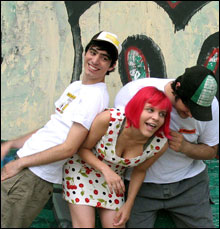 It was 2002 when the then unknown DJ Diplo first started throwing his Hollertronix parties in Philadelphia. Nothing special about that really, except that he’s more than your average DJ: like any cultural curator — say, art-school instigators Andy Warhol and Tony Wilson — he created a new æsthetic in his discipline that corresponded with the advent of mash-ups. He’s become a tastemaker, a hunter of new sounds and unique combinations. In the process, he’s helped forge a universalist approach to consuming music. Everything is fair game, from Lil’ Jon to the Smiths, Missy Elliott to the Strokes, Kelly Clarkson to Daddy Yankee. Hollertronix represented a celebration of liking it all. It all came together for Diplo when he was asked to produce a track for Arular (XL/Beggars), the 2005 debut by the genre-bending London-based Sri Lankan siren M.I.A. (He also produced her breakthrough mixtape, Piracy Funds Terrorism, Volume 1.)
It was 2002 when the then unknown DJ Diplo first started throwing his Hollertronix parties in Philadelphia. Nothing special about that really, except that he’s more than your average DJ: like any cultural curator — say, art-school instigators Andy Warhol and Tony Wilson — he created a new æsthetic in his discipline that corresponded with the advent of mash-ups. He’s become a tastemaker, a hunter of new sounds and unique combinations. In the process, he’s helped forge a universalist approach to consuming music. Everything is fair game, from Lil’ Jon to the Smiths, Missy Elliott to the Strokes, Kelly Clarkson to Daddy Yankee. Hollertronix represented a celebration of liking it all. It all came together for Diplo when he was asked to produce a track for Arular (XL/Beggars), the 2005 debut by the genre-bending London-based Sri Lankan siren M.I.A. (He also produced her breakthrough mixtape, Piracy Funds Terrorism, Volume 1.)
“It seems a lot of DJs today are taking pride in their scenes, and how far they can go and have a great party,” he writes in an e-mail regarding the impact of Hollertronix. “There wasn’t a thinking like this one year ago. But I can definitely see all these new young kids producing and working harder at DJing and moving music [forward] faster.”
Diplo isn’t exactly standing in place himself. He’s always had a talent for picking up on the newest trends. Last summer, he could be found at the Knitting Factory spinning opening sets for grime up-and-comer Kano. And this past February, he unveiled his new label, Mad Decent (a partnership with Phoenix contributor Chris Nelson), by releasing a 12-inch by the unknown Brazilian baile funk group Bonde do Role.
 Bonde, as Diplo affectionately refers to them, fall in the tradition of invigorating Brazilian dance music that’s been reared in the filthy favela slums of Rio de Janeiro over the past decade. But until Diplo brought it over and threw it into the pan-cultural pastiche Arular, it was all but unknown outside South America. Its fan base in the US remains minuscule — something he hopes to change with Bonde do Role’s more accessible, more Americanized take on the form. “People say, yeah, I like baile funk, but only really nerdy kids on the Internet can name one artist!” he points out. “I thought, let’s have a fun artist, let’s produce a group proper for the world — just as an experiment.”
Bonde, as Diplo affectionately refers to them, fall in the tradition of invigorating Brazilian dance music that’s been reared in the filthy favela slums of Rio de Janeiro over the past decade. But until Diplo brought it over and threw it into the pan-cultural pastiche Arular, it was all but unknown outside South America. Its fan base in the US remains minuscule — something he hopes to change with Bonde do Role’s more accessible, more Americanized take on the form. “People say, yeah, I like baile funk, but only really nerdy kids on the Internet can name one artist!” he points out. “I thought, let’s have a fun artist, let’s produce a group proper for the world — just as an experiment.”
“Traditional” baile funk — also referred to as funk carioca, favela funk, or just plain funk, if you’re in Rio — comes from the ghetto, he says, but the three kids in Bonde do Role grew up listening to it in the suburbs. Its drums are loud, its vocals super-sexual, its rhythms reminiscent of double-dutch schoolyard chants. The beats are propulsive and consistently twisted around a set of playful rhythmic flourishes. In Brazil this music isn’t purchased, it’s simply heard — 2000 kids or more at every Rio party, Diplo claims, and up to 5000 parties every week. “It’s as strange and street-driven as any music has ever been.” And he concedes that Bonde do Role aren’t even a “beep on the radar” in Rio, much less the world at large.
But Diplo isn’t trying to put one over on anyone either. He’s the first to admit that Bonde do Role are middle-class kids who’ve appropriated the vocabulary of baile funk. What they’re doing, he explains, sounds more like a funk-infused parody of traditional Brazilian music than the really dirty favela stuff. They’re fourth-wave baile funk, fans, not pioneers, and their new single is all about having fun with the music they grew up with.
Like M.I.A.’s recordings, the Melo do Tabaco 12-inch is a bewildering grab bag of worldly pop. The six tracks (the title track, an instrumental version, an a cappella version, and three B-sides) hop and fly, just as catchy in their melodies as anything on American Top 40 radio. “Melo do Tabaco” includes an Alice in Chains sample, and there’s a “doo-wah-ditty” refrain in “Jabuticaba.”
Nothing quite like Melo do Tabaco has ever put much of a dent in the US market. Bonde’s only arguable antecedent comes from the old Hollertronix nights in Philly, which brought leagues of suburban kids out to the dance floor to hear Cam’ron, Gang of Four, and Lil’ Jon in the same set.
So if anyone can popularize baile funk in the US, Diplo’s the man. With Hollertronix, he took the notion of “I like all kinds of music” away from the people who really didn’t and gave it to kids who really did. He established the cultural landscape necessary for something as invigoratingly weird as Bonde do Role. Now he’s hoping that baile funk can transcend its blogger-fueled cult following here in the US. Last month, he went to Brazil to begin work on Bonde do Role’s full-length and film a Rio funk documentary. The idea is to create a more complete context for American fans. “That’s what’s missing, there is no context. It’s just exoticized and trendy. I hope to change that, to make it a little more viable in people’s eyes.”
He’s already proved he has an ear for what works. And anyone tempted to accuse him of cultural exploitation should consider that without Diplo baile funk wouldn’t even be a beep on the Internet. Buying a few Brazilian discs on a tour stop and bringing them home may be no great achievement, but he’s the one who did it. And he’s the one who’s fighting to bring it to a larger audience.